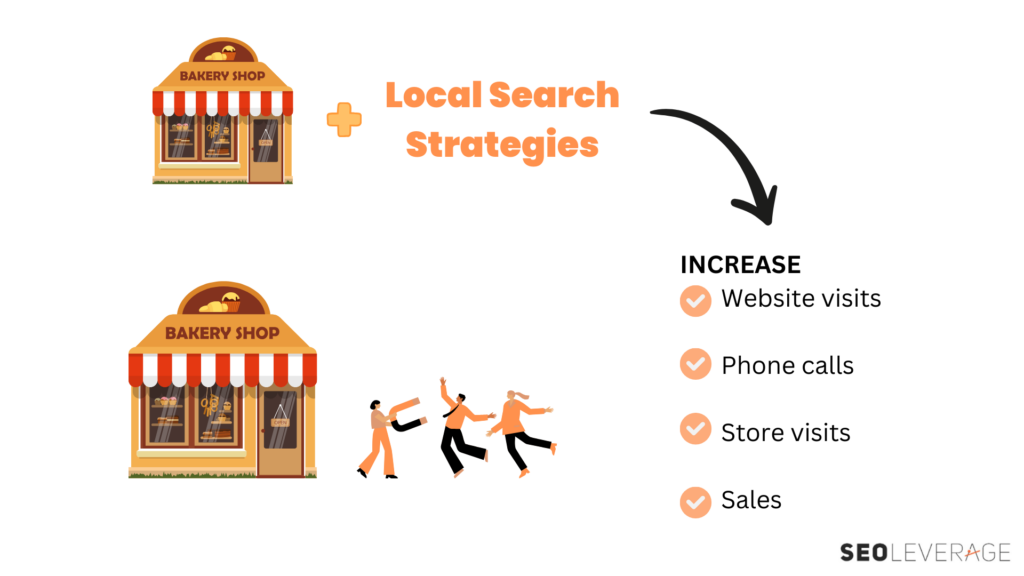In the digital age, local businesses compete for the top spot in local search results. Understanding and implementing effective local search strategies becomes more imperative.
We've seen the remarkable impact of a solid local SEO strategy on business visibility and customer engagement. Today, we're excited to share the top 8 tips to enhance your local search engine optimization. These tips will help ensure that your business appears in relevant local results and dominates them.
1. Optimize Your Google Business Profile
Your Google My Business profile is the bedrock of your local search presence. It's where potential customers find essential business information – your address and phone number. Customers also read online reviews and see your business hours.
- Encourage Positive Reviews: Customer feedback on your Google Business Profile can significantly influence prospective customers and improve your local search rankings.
- Update Business Information: Check that your business name, address, and phone number are up-to-date. This maintains consistency across online directories and business listings.
2. Implement Local Keywords
Identify keywords that resonate with your local audience. Keyword research lets you know what potential customers are searching for. Integrate these local keywords into your website's title tags, meta descriptions, and content. This boosts your visibility in search engine results pages (SERPs).
- Target Keywords: Identify keywords specific to your local market and service area. Incorporate these into your website to appear in relevant searches and attract local prospects.
- In-depth Keyword Research: Do in-depth keyword research to find high-volume keywords. Choose keywords relevant to your local business and service area. Analyze search volume and competition for keywords to prioritize those you should optimize for.
Keyword research tools like Ahrefs or Moz Keyword Explorer let you enter your business location and search niche. You can use them to find related long-tail keywords with high monthly searches but low competition.
Identifying these "money" keywords will allow you to target highly relevant searches. It will draw more local customers to your website and business.
3. Leverage Local Business Schema
Local business schema, or structured data markup, is a powerful tool. It helps search engines understand your business website's content. This can include information about your local business. You can also share customer success stories. You can even have details about local events you're involved in.
- Highlight Business Information: Use schema to detail your operating hours, address, and phone number. This makes this information readily accessible to search engines and local searchers.
- Schema Markup Examples: Include examples of schema markup codes you can use. Examples are BusinessProfile, OpeningHours, AggregateRating, and Events schema. They provide essential business details to search engines.
| Type of Schema | Description |
| BusinessProfile schema | You can specify your business name, address, phone number, and logo image. It also includes information such as your opening hours and days. |
| OpeningHours schema | It helps search engines understand your operating hours. |
| AggregateRating schema | It shows customer ratings and reviews on your Google Business profile. |
| Events schema | It allows you to mark up details of local events, seminars, or classes your business is hosting. This provides search engines and users contextual information about what's happening. |
Properly implementing structured data helps search engines understand the true nature of your business pages. It also increases your chances of ranking for relevant local search queries.
4. Focus on Local Search Optimization
Local search optimization is about making your business visible in the local search results. This involves optimizing your business listings in high-quality local directories. Ensure your information is consistent across multiple location pages.
- Business Directories: List your business in reputable local directories. It will boost local traffic and improve your local search rankings.
- Service Area and Location Pages: For multiple service areas, create specific location pages. Tailor the content and use local keywords to attract customers in those areas.
- Consistent Business Information: Maintain consistent business details across your website, Google Business profile, and other online directories. Use the same business name, address, and phone number.
5. Encourage and Manage Online Reviews
Online reviews are a testament to your business's reputation and quality. Encourage satisfied customers to leave good reviews on your Google Business Profile.
Responding to both positive and negative reviews portrays how you value customer feedback. It also shows that you are committed to improving the customer experience.
- Monitor Reviews: Regularly check and respond to reviews to engage with your local community. This will improve your business's online reputation.
- Review Marketing Strategies: Outline specific review marketing strategies. You can use a customer review collection form and online and offline incentives for reviews. Also, respond promptly to feedback.
Strategies that you can include:
- Use your website’s online review collection form to prompt happy customers to leave feedback. You can also place physical review forms in your store location.
- Offer incentives like discounts, gift cards, or loyalty points for making the effort to write a review. Make sure to comply with Google and other policies regarding incentives.
- Always aim to respond to reviews within 24 hours, whether positive or negative. Address issues raised in negative reviews to gain user trust.
- Monitor reviews on Google and other listings. Address inconsistencies in business information, operating hours, or further details. These can impact user experience.
6. Utilize Local Search Marketing Techniques
Local search marketing involves strategies that increase your business's visibility in search engine results. This includes optimizing your Google Business Profile. Engage in regional SEO strategy. Ensure your site is mobile-friendly. This caters to local searches done on mobile devices.
- Mobile Search: Mobile search is increasingly common. A mobile-friendly website is crucial for reaching local audiences who search on the go.
- Additional Local Marketing Tactics: Discuss other local marketing tactics to boost your presence. These tactics include local directory listings, citations, social media marketing, and local advertising.
- Make sure that business listings are complete and consistent. Add them to high-quality local directories like Foursquare, Bing, and Yahoo Local.
- Citations refer to third-party mentions of your business name, address, and phone number. They strengthen your credibility in search results.
- Create geotagged local social media posts and ads. Use location-specific hashtags and information to boost visibility.
- Outdoor advertising like posters, bus stop/metro ads, flyers, and local newspaper listings can increase your community's brand awareness.
Using multiple local marketing channels helps cast a wider net. It brings your business to customers' attention within your target area.
7. Engage with the Local Community
You can significantly boost your local presence by engaging with your local community through local events, sponsorships, or featuring local news. Share these activities on your website and different social media platforms. This will increase your local visibility and help you connect with customers and other businesses.
- Local Events and News: Regularly update your site with information about local events, sponsorships, and news. This will keep your site relevant and engaging to your local audience.
- Community Partnerships: Explain how partnering with other local businesses and organizations through initiatives, promotions, and cross-promotions help you connect with potential customers.
Specifically:
- Look for synergies with complementary businesses to run joint promotions, workshops, or events. For example, a yoga studio could collaborate with a juice bar or health store.
- Partner with local charities, schools, or sports teams for branding opportunities at their events. In exchange, offer sponsorships or donations.
- Cross-promote each other through blogs, social media posts, and newsletters to expand your customer reach within the community. Strategic partnerships help increase goodwill and visibility.
You can strengthen relationships by demonstrating your commitment to giving back to the local community. You can also gain loyal customers among residents. It's a win-win for both businesses and the people.
8. Monitor and Adapt Your Strategy
Local search engine optimization is a continuous process. Use tools to monitor your local rankings. Identify keywords that bring in traffic. Understand how local customers find your business. Adapt your strategy based on this data. Continually improve your search visibility and connect with more potential customers.
- Analytics: Regularly review your performance in search engine results. Look where you can improve and how you can better target your local audience.
- Adjust Tactics Based on Results: Analyze data to evaluate which tactics work. Refrain from using tactics that aren't working to maximize the ROI of local marketing efforts.
Specifically,
- Regularly monitor key performance metrics like website traffic, leads, sales, and reviews. They come from different marketing channels.
- Kill strategies that don't show proportionate results even after modification over time. Refocus budget and efforts on the most effective campaigns.
- Analyze search queries, location insights, and keywords, driving maximum traffic on mobile and desktop. Find repeat customers. Optimize around high-intent searches.
- Make decisions based on data to optimize your local marketing mix iteratively. Use what's delivering results instead of anecdotal assumptions. This helps allocate scarce resources efficiently.
Testing new tactics, analyzing impacts, and adjusting are crucial to finding the most successful local growth formula. Tailor it for your unique business and customer profile.
Do you want to delve deeper into SEO for Spain? We invite you to read this article.

Conclusion
Any small business needs to master local search strategies. This is essential to increase visibility and attract more local customers. Optimizing your Google Business Profile can significantly improve your position in the local search results. Engage in targeted keyword research. Leverage local business schema. Actively manage your online reputation through reviews.
Remember, local SEO is about more than just appearing in searches. It's about connecting with your local community, understanding the local market, and providing value to local customers. Follow these top tips and commit to ongoing optimization and engagement. Your business is well on its way to dominating the local search landscape.
Ready to boost your local SEO and dominate the local scene? SEOLeverage is your partner for success. Contact us today!

